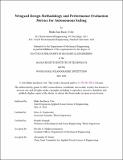Wingsail Design Methodology and Performance Evaluation Metrics for Autonomous Sailing
Author(s)
Cole, Blake Ian Barry
DownloadThesis PDF (72.45Mb)
Advisor
Traykovski, Peter A.
Schmidt, Henrik
Terms of use
Metadata
Show full item recordAbstract
This dissertation explores an innovative approach to the design of aerodynamically-actuated wingsails, along with advancements in marine vehicle autonomy focused on vessel tracking and collision avoidance. The first segment of this research introduces a deterministic wingsail design optimization framework that leverages geometric programming to efficiently generate optimal wingsail designs. The proposed methodology is then validated through the development and deployment of a bespoke wingsail data acquisition system called the WingDAQ, which enables quantitative analysis of the unsteady forces affecting wingsail performance in realistic sailing conditions. The results highlight the limitations of traditional aerodynamic models due to unsteady flow conditions, and suggest that lighter wingsails designed with higher lift-to-drag ratios and faster natural frequencies enhance sailing performance. This thesis also introduces a novel instantiation of the unscented Kalman filter (UKF) that is particularly well suited to long-distance surface vessel tracking, and facilitates affordable collision avoidance capabilities on autonomous surface vessels. One such low-cost collision avoidance system is presented, utilizing real-time data from the Automatic Information System (AIS) and the behavior-based autonomy middleware, MOOS-IvP. Field tests confirm the robustness of this framework, establishing a foundation for the integration of physics-based design optimization and adaptive autonomy for wind-powered marine vehicles.
Date issued
2024-05Department
Massachusetts Institute of Technology. Department of Mechanical EngineeringPublisher
Massachusetts Institute of Technology